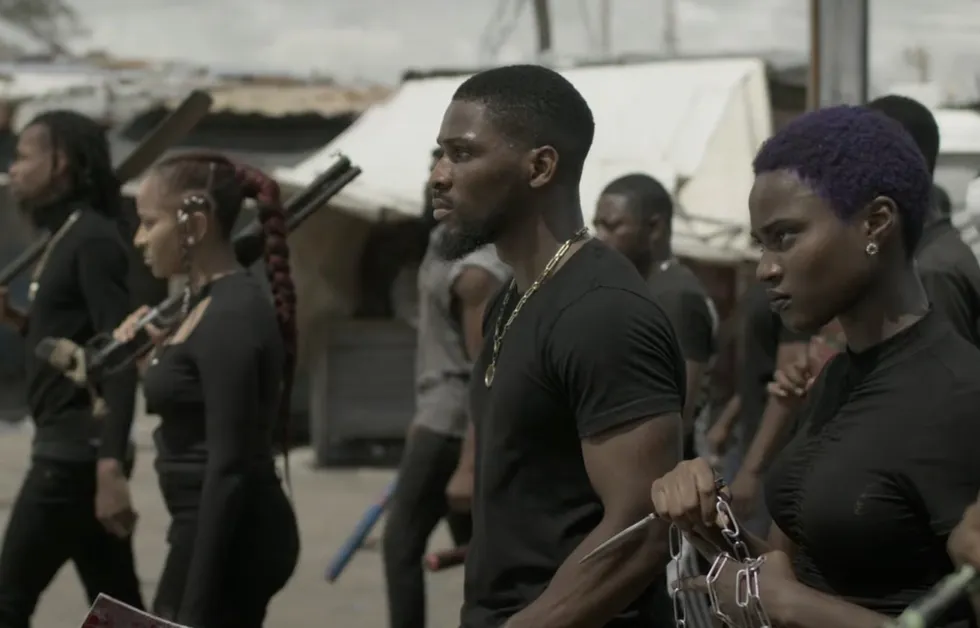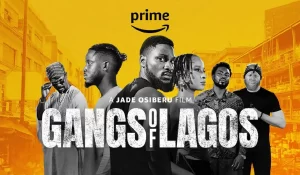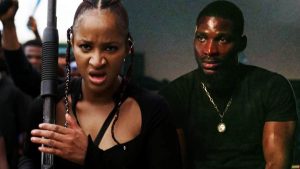
Gangs of Lagos movie: When creativity becomes de-marketing
The movie Gangs of Lagos has drawn a huge rebuke from the Lagos State Government for casting Lagos culture in a bad light. But when does creativity cross the line? Joseph Ekeng writes.
The movie Gangs of Lagos by Jade Osiberu is the toast of many movie lovers in Nigeria and outside. Movie analysts have described it as a purge of fresh sensation because it directly brings the spotlight on the prevalence of gangsterism in Nigerian politics, using Lagos as a case study.
The movie is a collaboration between Jade, who is fast carving a niche for herself as the queen of the action movie genre, and Amazon’s Prime Movie.
For those who grew up in Lagos, especially on Lagos Island, the storyline in Gangs of Lagos is very familiar. It is a story of the life of the lower-class Lagosians living in Isale Eko and the pipeline of thuggery from ordinary street thugs popularly called ‘Area Boys’ to top political figures.
The movie zeroes in on Obalola Akande (Tobi Bakare) on his journey from childhood as a young boy growing up on the streets of Isale Eko in Lagos under the mentorship of gang leaders, and how their influences play out in making him the man he becomes.
Gangs of Lagos, which is Prime Movie’s maiden Nollywood original since entering the Nigerian market in 2022, has received a lot of positive reviews on the streets and across social media platform channels.
Despite the success of the movie, however, the Lagos State Government is not so impressed. In fact, the state government has issued an official statement, describing it as a total abomination for the way it portrays Lagos.
Lagos State Commissioner for Tourism, Arts and Culture, Mrs. Uzamat Akinbile-Yussuf, described the film/series as very unprofessional and misleading and its content as derogatory of Lagos culture.
“It is an unjust profiling of a people and culture as being barbaric and nefarious. It depicts a gang of murderers rampaging across the State,” she added.
Akinbile-Yussuf, in her submission, stressed that “the Eyo Masquerade” as portrayed in the movie is “equally used as a symbol of honour for remarkable historical events”.
“It signifies a sweeping renewal, a purification ritual to usher in a new beginning, a beckoning of new light, acknowledging the blessings of the ancestors of Lagosians,” she stated.
But the question is, when does creativity become unjust profiling or demarketing? And is there anything that can be done to ensure balance?
The stern rebuke by the Lagos State Government is understandable. In the past years, sustained efforts have been made towards rebranding and improving the image of the state. “The Greater Lagos” campaign is the latest of such.
The government has also aggressively invested in infrastructure to boost tourism. So it worries that whatever may have been achieved through years of effort could be undone by the Gangs of Lagos movie.
It’s noteworthy to stress that the comment by the Lagos government brings to mind the raging debate about finding a balance between creativity and public interest.
In the recent past, there has been a lot of criticism directed at Nollywood for demarketing Nigeria and demonizing the country’s culture.
Nigerian films are a crucial window through which the rest of the world sees and gains insight into Nigeria’s culture, but some people believe that Nollywood is making the worst of that opportunity.
Some analysts have said that the undue focus on issues of vices, including juju, money rituals, and gangsterism does a lot of damage to Nigeria’s brand image and fuels the negative stereotype against Nigerians when they travel abroad.
They also noted that the government’s destination branding effort is under threat for as long as the movie producers are allowed free reign to demonise the country’s culture and traditions.
According to Azuka Onwuka, a movie analyst, right from Living in Bondage, producers of Nigerian movies have tended to cast the Nigerian traditional life as evil, as well as portraying Nigerians as people who make their money through the power of the occult and human sacrifice.
Reno Omokri, a public commentator, corroborated the foregoing and said, “I have been to many African and Caribbean countries. Once they know you are Nigerian, many become wary. Not because of 419. But because of juju. Nollywood has conditioned them to see all Nigerians as fetish, juju people. We did this to ourselves.”
Continuing, Reno added, “You will never see a Bollywood movie project Indian culture the way Nollywood movies project African culture. Many of us fell in love with India and Indians because of Bollywood movies.
“But if an Indian watched a Nollywood movie, he would be afraid of Africa. Hollywood was used by America to market her culture and commerce to the world by glamorising America. Nollywood, on the other hand, is being used to demarket Africa to the world by demonising our culture and commerce.”
Obviously, there are many sides to this debate. Some supporters of the Nollywood industry have insisted that if the government truly wants Nollywood for destination branding, they should be more deliberate about it by supporting and partnering with the industry.
And since Nollywood stars have unwittingly become ambassadors of Nigeria across Africa and beyond, the government can partner with them as part of destination branding initiatives. Doing so will give the industry a greater sense of belonging in the Nigerian project.






Comment
No comments found.